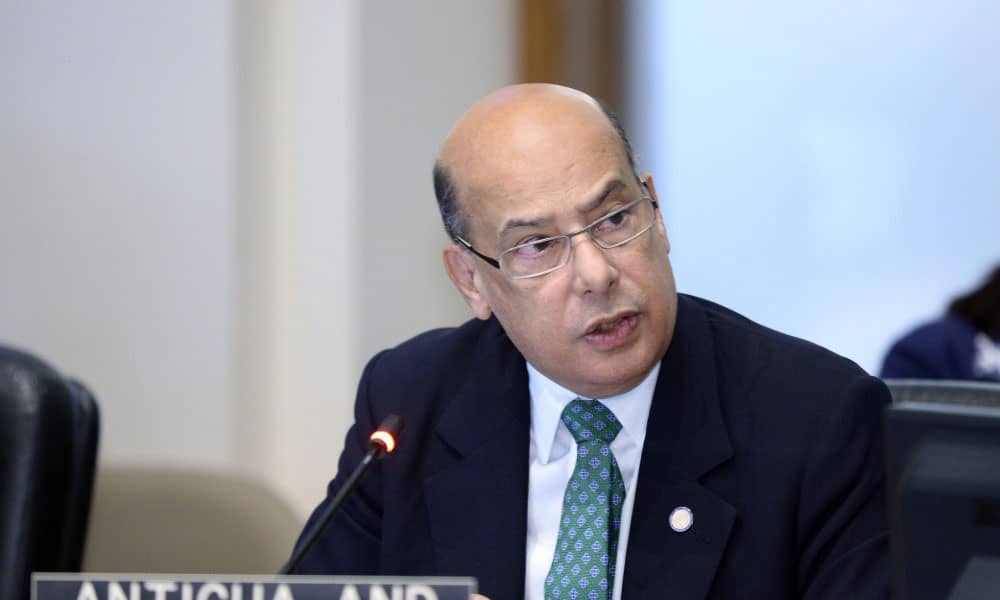
BY- Sir Ronald Sanders
CLICK HERE TO JOIN OUR WHAT’S APP GROUP
Recently, the smaller member states of the Caribbean Community and Common Market (CARICOM) have renewed complaints that the promised benefits and compensatory mechanisms that convinced them to join first CARIFTA in 1968, and later CARICOM in 1973, have not materialized.
While the larger economies – Trinidad and Tobago, Jamaica, and Barbados – have leveraged CARICOM to gain preferential trade access to the smaller economies of the Organization of Eastern Caribbean States (OECS), reciprocal access has been denied through non-tariff barriers and other restrictive measures.
The implementation of the Common External Tariff (CET), designed to protect goods produced in larger CARICOM economies, has also led to higher consumer prices for smaller states, depriving them of the ability to source cheaper goods from extra-regional markets.
This issue was extensively discussed in the West Indian Commission’s 1992 Report, “Time for Action,” which underscored the urgent need for a more equitable distribution of benefits in regional integration.
The report highlighted how smaller economies were at a disadvantage in trade relations within CARICOM and recommended stronger mechanisms to ensure balanced participation.
However, more than three decades later, many of these recommendations remain unimplemented.

From its inception, the CARICOM Single Market and Economy (CSME) was meant to foster balanced regional economic integration, ensuring that smaller economies were not left at a disadvantage.
To that end, compensatory mechanisms such as the CARICOM Development Fund (CDF) were introduced, but they have failed due to inconsistent and inadequate contributions from the larger member states.
Without adequate funding, smaller economies have been unable to diversify, modernize their industries, or compete equitably within the regional market.
The CDF was envisioned as a tool for redistributing the gains of integration, yet it remains severely underfunded, with only sporadic contributions from the beneficiary countries.
The free movement of labour, another cornerstone of CARICOM’s integration efforts, was also intended to compensate for the closure of small-scale manufacturing enterprises in the OECS that could not withstand competition from the larger states.
However, even this mechanism, which would have allowed smaller economies to take advantage of employment opportunities in larger CARICOM states, has not benefited nationals of OECS countries.
This issue was highlighted in the 2018 ILO Report on Caribbean Labor Mobility, which found that intra-regional migration patterns heavily favour larger states, limiting opportunities for smaller economies.
Jamaica and Guyana were the main beneficiaries of movement by unskilled labour over the period 1975 to 2018.
At a time of global economic uncertainty, shrinking access to affordable financing, the worsening effects of climate change, and a retreat from multilateralism, CARICOM should be a stronger, more unified bloc.
Instead, the deep-seated trade disadvantages affecting smaller states have been allowed to fester, undermining regional solidarity. It should be noted that while Belize, Guyana and Suriname also suffered, the members of the OECS were most affected,
Despite decades of effort to establish a genuine Caribbean Single Market and Economy (CSME), this work remains largely incomplete.
The necessary legal, structural, and compensatory mechanisms remain underdeveloped or unimplemented. However, even within the limited aspects of the CSME that have been established, Trinidad and Tobago has been the principal beneficiary,
Blame for the failure to advance the CSME does not lie with the regional public servants who have worked tirelessly for years to advance regional integration.
Instead, it falls squarely on political leaders who prioritize national sovereignty and economic self-interest over regional progress.
The unwillingness of CARICOM governments to enforce commitments made in the Revised Treaty of Chaguaramas has left the promise of CARICOM unfulfilled for the mass of its people.
This failure extends beyond trade. CARICOM’s ability to coordinate foreign policy – once a source of strength in the 1970s – has also deteriorated.
On crucial geopolitical matters, the member states have become vulnerable to external influence, easily divided by powerful nations seeking bilateral advantage.
None of this is in CARICOM’s interest – especially now, when small states face existential threats that require a united regional front.
CARICOM’s founding visionaries, including Sir Shridath Ramphal and P.J. Patterson, recognized that only through deeper economic cooperation, a common foreign policy, and collective bargaining could the region safeguard its sovereignty and ensure prosperity for all members. Their legacy should serve as a guidepost, reminding the region of what is at stake when unity is compromised.
Urgent reforms must be undertaken to render CARICOM more effective, particularly by making its trading system truly equitable.
These could include: reinvigorating the CARICOM Development Fund (CDF) by making contributions mandatory for larger states, ensuring sustained funding to support economic diversification in smaller economies; eliminating non-tariff barriers that restrict exports from smaller states, including bureaucratic delays and arbitrary licensing requirements that effectively block market access; creating enforceable rules for free movement of labour to ensure that OECS nationals have equal opportunities to migrate for work without unnecessary restrictions; and strengthening CARICOM’s foreign policy coordination by establishing a mechanism for collective decision-making that prevents external powers from exploiting divisions within the bloc.
One thing, however, must never be considered – the abandonment of the regional integration movement. Despite its shortcomings, CARICOM remains a crucial bulwark against global marginalization.
Without it, member states risk becoming mere geopolitical real estate, vulnerable to economic and political absorption by larger powers.
The only viable path forward is a reinvigorated CARICOM – one that eschews insularity and delivers on its foundational promises of fairness, equity, and shared prosperity for all members, large and small alike.
As veteran advocate of Caribbean integration, Dr. Ralph Gonsalves aptly stated, “The quickening pace of the challenges of nature and the global economic challenges have made it imperative that we build a CARICOM that is better and stronger while recognising its inbuilt and operational limitations.”
CLICK HERE TO JOIN OUR WHAT’S APP GROUP
CLICK HERE TO JOIN OUR WHAT’S APP GROUP
CLICK HERE TO JOIN OUR WHAT’S APP GROUP
CLICK HERE TO JOIN OUR WHAT’S APP GROUP
CLICK HERE TO JOIN OUR WHAT’S APP GROUP
CLICK HERE TO JOIN OUR WHAT’S APP GROUP
CLICK HERE TO JOIN OUR WHAT’S APP GROUP
CLICK HERE TO JOIN OUR WHAT’S APP GROUP
CLICK HERE TO JOIN OUR WHAT’S APP GROUP
CLICK HERE TO JOIN OUR WHAT’S APP GROUP
CLICK HERE TO JOIN OUR WHAT’S APP GROUP
CLICK HERE TO JOIN OUR WHAT’S APP GROUP
CLICK HERE TO JOIN OUR WHAT’S APP GROUP
Advertise with the mоѕt vіѕіtеd nеwѕ ѕіtе іn Antigua!
We offer fully customizable and flexible digital marketing packages.
Contact us at [email protected]

















It’s a valid question—smaller nations often seem to get the short end of the stick in regional agreements. CARICOM needs to ensure that all member states truly benefit, not just the larger ones.
Instead of asking if it’s failing, maybe the focus should be on how to make it work better for smaller nations.
Comments are closed.